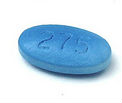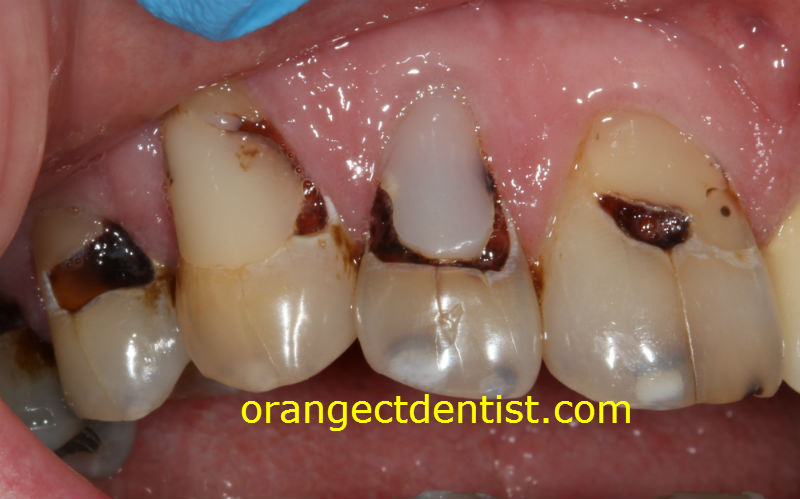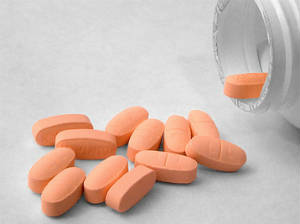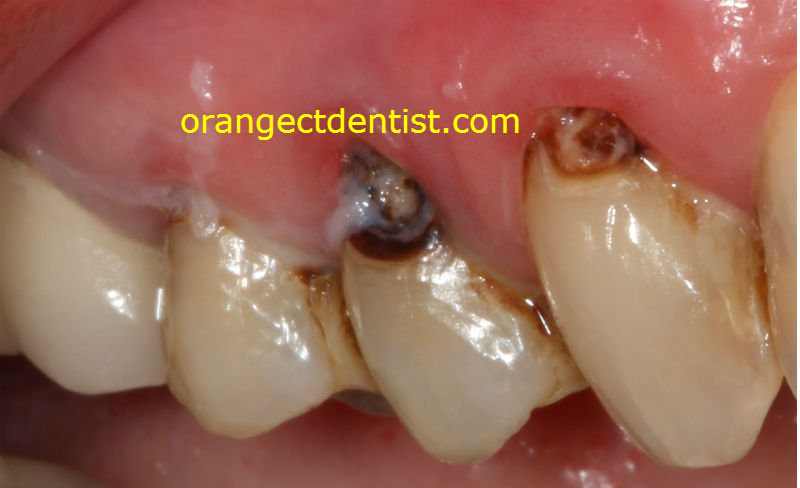
Is this causing dry mouth?
Many older patients in our practice in Orange, CT take medications as part of their daily routine. However, many of these prescription drugs have an unwanted side effect: dry mouth, more formally called xerostomia.
In fact, the most commonly prescribed medication in the United States in 2012 lists xerostomia a common side effect!
Chronic dry mouth can have a profound effect on the oral cavity, leading to dental decay (cavities) as well as inflammation of the gum tissue.
Without treatment, the results of the dry mouth can be devastating: loss of some or all of your teeth!
Photo of Tooth Decay from Dry Mouth

Teeth with decay (cavities) from chronic dry mouth on a patient from Woodbridge, CT. Photo and subsequent treatment by Dr. Nicholas Calcaterra.
The above photo shows quite dramatically the decay (also known as cavities) that can occur due to dry mouth. We see decay both at the gum line as well as near the edges or tips of the teeth. This is the classic pattern of decay due to xerostomia.
Common Drugs which Cause Xerostomia

The most widely prescribed drug in the U.S. is associated with dry mouth!
Older adults take many medications which can lead to dry mouth. Some of them include:
- Medications for high blood pressure: ACE inhibitors, Angiotensin II Receptor Blockers, Diuretics, and others.
- Anti-cholinergic medications used to treat a variety of conditions.
- Many anti-depressant medications (Zoloft, Celexa, etc.).
- Narcotic based pain relievers such as Vicodin and Percocet.
As previously mentioned, the most commonly prescribed pain medication in 2012 was Vicodin and is associated with xerostomia.
Why Dry Mouth Leads to Tooth Decay
Saliva has numerous qualities which help to reduce decay and gum disease. A partial list includes:
- Contains buffers which help to neutralize acids from foods (soda, candy, fruits, etc.)
- Possess several anti-microbial proteins which kill harmful bacteria.
- Serves to mechanically cleanse and remove food debris.
- Helps to remineralize damaged tooth structure.
- Any many other functions.
As you can imagine, if the amount of saliva is reduced, the normal benefits of saliva are not realized.

Another photo of dental decay from chronic dry mouth from medications. This patient was from West Haven, CT. Photo and subsequent treatment by Dr. Nicholas Calcaterra.
Treatment for Chronic Xerostomia
Our patients are on medications for important reasons, so we can’t have them discontinue the medications solely because of the effects of dry mouth. But there are several options for either increasing the amount of saliva and/or protecting the teeth. These include:
- High fluoride content toothpastes and rinses to reduce the likelihood of further tooth decay. An example is Prevident.
- Chewing xylitol based gum. The chewing action stimulates salivary flow and the xylitol is proven to reduce tooth decay.
- Various toothpastes, mouthrinses, gels and other products designed solely to moisten the soft tissue and help your mouth feel wetter. The products from Biotene are the most common.
- Sucking on sugar free candies throughout the day, stimulating saliva flow.
You should work with your dentist and physician to determine if your medications are causing dry mouth and if so, the degree to which the dryness is affecting your overall oral health. From there, the appropriate treatment (if any) can be recommended.
